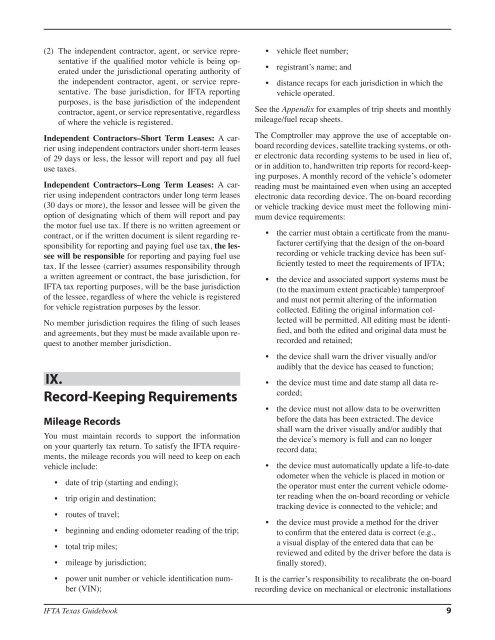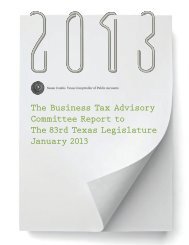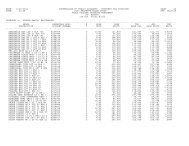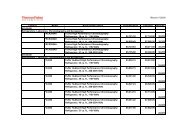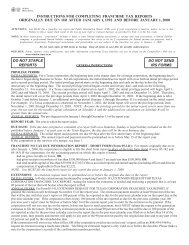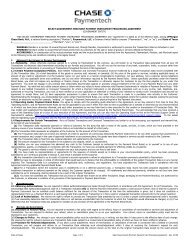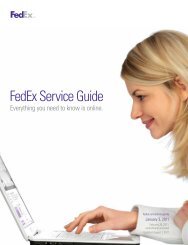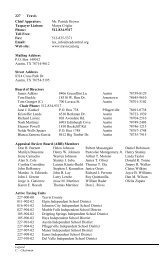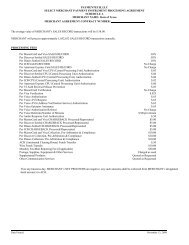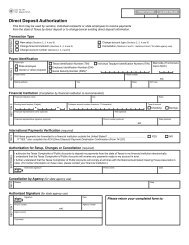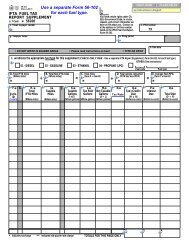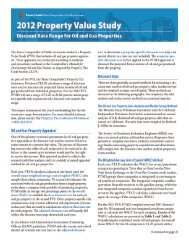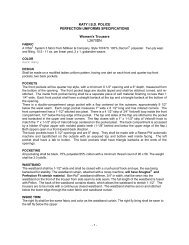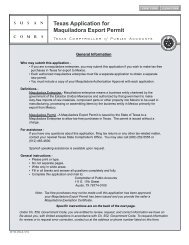International Fuel Tax Agreement - Texas Comptroller of Public ...
International Fuel Tax Agreement - Texas Comptroller of Public ...
International Fuel Tax Agreement - Texas Comptroller of Public ...
- No tags were found...
You also want an ePaper? Increase the reach of your titles
YUMPU automatically turns print PDFs into web optimized ePapers that Google loves.
(2) The independent contractor, agent, or service representativeif the qualified motor vehicle is being operatedunder the jurisdictional operating authority <strong>of</strong>the independent contractor, agent, or service representative.The base jurisdiction, for IFTA reportingpurposes, is the base jurisdiction <strong>of</strong> the independentcontractor, agent, or service representative, regardless<strong>of</strong> where the vehicle is registered.Independent Contractors–Short Term Leases: A carrierusing independent contractors under short-term leases<strong>of</strong> 29 days or less, the lessor will report and pay all fueluse taxes.Independent Contractors–Long Term Leases: A carrierusing independent contractors under long term leases(30 days or more), the lessor and lessee will be given theoption <strong>of</strong> designating which <strong>of</strong> them will report and paythe motor fuel use tax. If there is no written agreement orcontract, or if the written document is silent regarding responsibilityfor reporting and paying fuel use tax, the lesseewill be responsible for reporting and paying fuel usetax. If the lessee (carrier) assumes responsibility througha written agreement or contract, the base jurisdiction, forIFTA tax reporting purposes, will be the base jurisdiction<strong>of</strong> the lessee, regardless <strong>of</strong> where the vehicle is registeredfor vehicle registration purposes by the lessor.No member jurisdiction requires the filing <strong>of</strong> such leasesand agreements, but they must be made available upon requestto another member jurisdiction.IX.Record-Keeping RequirementsMileage RecordsYou must maintain records to support the informationon your quarterly tax return. To satisfy the IFTA requirements,the mileage records you will need to keep on eachvehicle include:• date <strong>of</strong> trip (starting and ending);• trip origin and destination;• routes <strong>of</strong> travel;• beginning and ending odometer reading <strong>of</strong> the trip;• total trip miles;• mileage by jurisdiction;• power unit number or vehicle identification number(VIN);• vehicle fleet number;• registrant’s name; and• distance recaps for each jurisdiction in which thevehicle operated.See the Appendix for examples <strong>of</strong> trip sheets and monthlymileage/fuel recap sheets.The <strong>Comptroller</strong> may approve the use <strong>of</strong> acceptable onboardrecording devices, satellite tracking systems, or otherelectronic data recording systems to be used in lieu <strong>of</strong>,or in addition to, handwritten trip reports for record-keepingpurposes. A monthly record <strong>of</strong> the vehicle’s odometerreading must be maintained even when using an acceptedelectronic data recording device. The on-board recordingor vehicle tracking device must meet the following minimumdevice requirements:• the carrier must obtain a certificate from the manufacturercertifying that the design <strong>of</strong> the on-boardrecording or vehicle tracking device has been sufficientlytested to meet the requirements <strong>of</strong> IFTA;• the device and associated support systems must be(to the maximum extent practicable) tamperpro<strong>of</strong>and must not permit altering <strong>of</strong> the informationcollected. Editing the original information collectedwill be permitted. All editing must be identified,and both the edited and original data must berecorded and retained;• the device shall warn the driver visually and/oraudibly that the device has ceased to function;• the device must time and date stamp all data recorded;• the device must not allow data to be overwrittenbefore the data has been extracted. The deviceshall warn the driver visually and/or audibly thatthe device’s memory is full and can no longerrecord data;• the device must automatically update a life-to-dateodometer when the vehicle is placed in motion orthe operator must enter the current vehicle odometerreading when the on-board recording or vehicletracking device is connected to the vehicle; and• the device must provide a method for the driverto confirm that the entered data is correct (e.g.,a visual display <strong>of</strong> the entered data that can bereviewed and edited by the driver before the data isfinally stored).It is the carrier’s responsibility to recalibrate the on-boardrecording device on mechanical or electronic installationsIFTA <strong>Texas</strong> Guidebook 9


